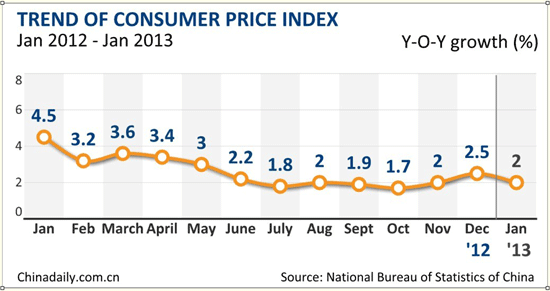China's January inflation slows to 2%
Updated: 2013-02-08 13:56
(Xinhua)
|
||||||||

BEIJING - China's consumer price index (CPI), a main gauge of inflation, grew 2 percent year on year in January, the National Bureau of Statistics announced Friday.
The consumer price index (CPI), a main gauge of inflation, grew 2 percent year on year in January, according to the NBS.
On a month-on-month basis, January's CPI rose 1 percent from the previous month, according to the NBS statement.
The month-on-month growth rate marked an 11-month high, as a cold winter and holiday demand have significantly pushed up vegetable and meat prices, said Yu Qiumei, a senior statistician with the bureau.
China is experiencing a unusually cold winter. Persistent icy weather in south China and lingering smog in north China have disrupted traffic and affected agricultural production, Yu said.
Food prices, which account for one-third of the prices used to calculate the CPI, rose 2.9 percent in January from one year earlier, pushing the index up 0.95 percentage points, according to the NBS.
However, January's CPI data was benign year-on-year partly because of the base effect. The year-ago comparison figure was high, as the Spring Festival holiday fell in January last year and pushed up food prices for that month.
The base effect contributed 1 percentage point to January's CPI growth year on year, the NBS said.
However, analysts say price pressure will build in the coming months.
The downward trend in January will be temporary. The country's inflation will pick up steam in February, with the growth rate accelerating to 2.7 to 2.9 percent, the China International Capital Corporation (CICC) said in a report.
The company's view was backed by Tang Jianwei, senior analyst at the financial research center under the Bank of Communications.
China's inflation will enter a preliminary upward phase in 2013, Tang said.
The country's economy has been steadily recovering and resurgent demand will drive up prices. Pork prices, which have a significant influence on the CPI, will regain momentum in 2013, he said.
Monetary quantitative easing implemented in the United States, Europe and Japan, together with China's rising labor and land costs, will all affect the country's inflation this year, Tang added.

 Li Na on Time cover, makes influential 100 list
Li Na on Time cover, makes influential 100 list
 FBI releases photos of 2 Boston bombings suspects
FBI releases photos of 2 Boston bombings suspects
 World's wackiest hairstyles
World's wackiest hairstyles
 Sandstorms strike Northwest China
Sandstorms strike Northwest China
 Never-seen photos of Madonna on display
Never-seen photos of Madonna on display
 H7N9 outbreak linked to waterfowl migration
H7N9 outbreak linked to waterfowl migration
 Dozens feared dead in Texas plant blast
Dozens feared dead in Texas plant blast
 Venezuelan court rules out manual votes counting
Venezuelan court rules out manual votes counting
Most Viewed
Editor's Picks

|

|

|

|

|

|
Today's Top News
Boston bombing suspect reported cornered on boat
7.0-magnitude quake hits Sichuan
Cross-talk artist helps to spread the word
'Green' awareness levels drop in Beijing
Palace Museum spruces up
First couple on Time's list of most influential
H7N9 flu transmission studied
Trading channels 'need to broaden'
US Weekly

|

|







